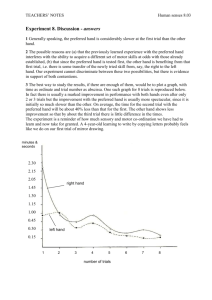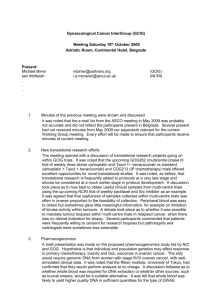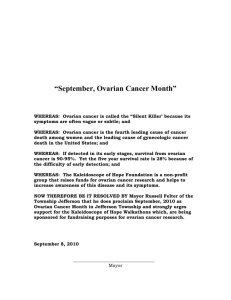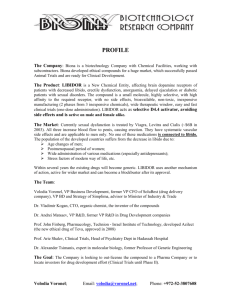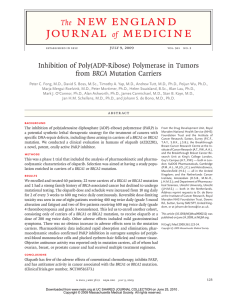Clinical Trials - Dana-Farber Cancer Institute
advertisement
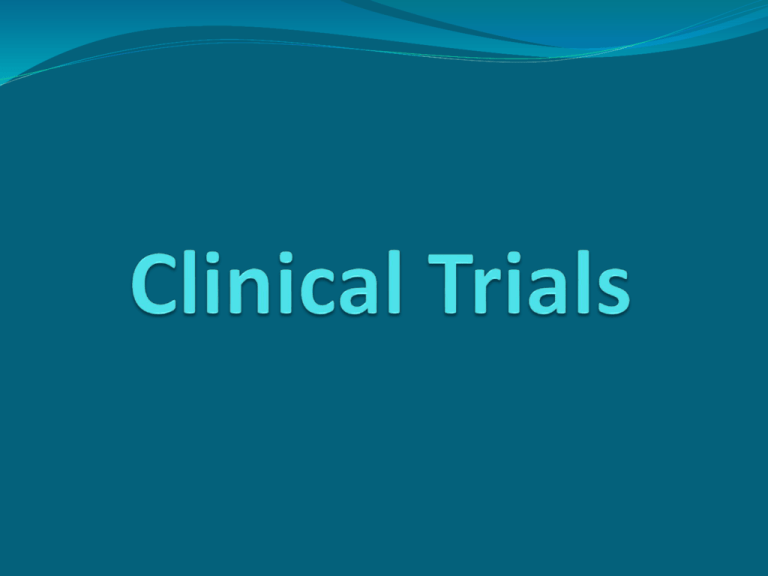
What are clinical trials? Phases of Clinical Trials Clinical trials of new medicines are done in phases: • Phase I • Phase II • Phase III Why are clinical trials important? They are key to developing new methods to prevent, detect, and treat cancer. To determine whether new treatments are safe, effective, and work better than current treatments. You are adding to our knowledge about cancer and helping improve cancer care. How do clinical trials work? • Protocol • Consent • Screening/Eligibility • Enrollment How do clinical trials protect participants? Scientific Review Board (SRC) Institutional Review Board (IRB) Office for Human Research Studies (OHRS) Data Safety Monitoring Board (DSMB) Patients’ Rights The informed consent document is not a contract. Taking part in a clinical trial is your decision. You have the right to withdraw from a study at any time for any reason. What to expect while on a clinical trial Where are we now in GYN oncology? • Active trials: ~22 • Trials under review: 6 • Trials close to submission: 1 • New concepts: 7 • Multicenter trials: ~7 Ovarian Cancer 12-159 Phase I Study of the Oral PI3kinase Inhibitor BKM120 or BYL719 and the Oral PARP Inhibitor Olaparib in Patients with Recurrent Triple Negative Breast Cancer or High Grade Serous Ovarian Cancer • BYL719 is known as a PI3kinase inhibitor. • Olaparib is known as a PARP inhibitor. Ovarian Cancer 14-263 A Study Evaluating the Safety and Pharmacokinetics of DMUC4064A in Patients with Platinum-Resistant Ovarian Cancer or Unresectable Pancreatic Cancer This is an antibody that has chemo linked to it. It delivers the chemo directly to the cancer cells that have the DMUC expression. Ovarian Cancer 14-430 Safety, Tolerability, and Potential AntiCancer Activity of Increasing Doses of AZD5363 in Different Treatment Schedules AZD5363 is an AKT inhibitor that blocks the pathways for tumor growth. Must have a AKT1 or PIK3CA mutation. Ovarian Cancer 14-547 A Study of AZD1775 + Chemotherapy versus Chemotherapy in Patients to Treat Ovarian, Fallopian Tube, or Peritoneal Cancer A randomized phase II study of AZD1775 plus chemotherapy versus chemotherapy alone. Must have a TP53 mutation. Ovarian and Endometrial Cancer 12-312 First-In-Human Study to Evaluate the Safety, Tolerability, Pharmacokinetics, and Pharmacodynamics of IMGN853 in Adults with Ovarian Cancer and Other FOLR-1 Positive Solid Tumors IMGN853 is an antibody that is linked to a cytotoxic agent that targets the Folate receptor (FOLR-1). Endometrial Cancer 13-520 Study Comparing AEZS-108/ZoptEC (Zoptarelin Doxorubicin in Endometrial Cancer) to Doxorubicin as a Second Line Therapy for Endometrial Cancer AEZS-108 is a molecule composed of two parts: • Doxorubicin + a hormone Cervical Cancer 13-334 GSK1120212 + GSK2141795 for Cervical Cancer • Trametinib is a MEK inhibitor: it blocks a protein called MEK that is commonly overactive in tumor cells. • GSK2141795 is an AKT inhibitor, which blocks a pathway (the PI3kinase pathway) that is commonly overactive in tumor cells. Vulvar Cancer 12-452 Radiation Therapy, Gemcitabine Hydrochloride, and Cisplatin in Treating Patients with Locally Advanced Squamous Cell Carcinoma of the Vulva. Radiation therapy together with gemcitabine and cisplatin. Finding Clinical Trials • www.dana-farber.org/Research/Clinical-Trials.aspx • www.nih.gov/health/clinicaltrials • www.clinicaltrials.gov • www.nhlbi.nih.gov/studies/index.htm

